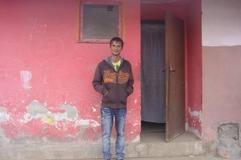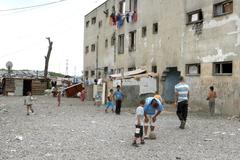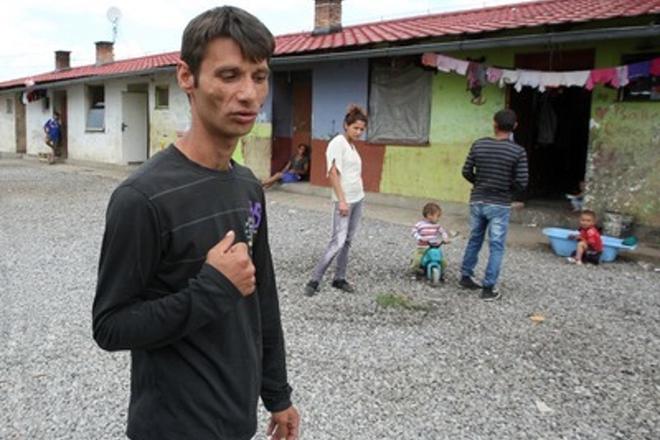The TV channel Al Jazeera came to Slovakia to report on Milan Hudák, who travelled more than 70 kilometers weekly from the Roma settlement in Moldava nad Bodvou where he lives to the Dr. Ámbédkar Grammar School in Hungary that specialises in educating people from segregated communities as Hudák tries to become a teacher. But now a mishap by state administration has prevented him from attending school for weeks.
“When I pay rent and additional expenses I have nothing more,” Hudák told The Slovak Specator. “The director came to me; gave me some money and said that I should immediately come back to school.”
Currently, Hudák survives on a material need benefit of €62.60 and as an external student he gets an activation contribution amounting to €63.07. With this income he also helps care for his sister and her three children.
In mid-April 2016 the labour office has sent him a letter informing that he no longer is eligible for the activation contribution as he failed to attend a mason course. The law, however, does not require students like Hudák, who is studying full time, to attend such requalification courses. Furthermore, Hudák never received the letter in the mail.
“The settlement at Budulovská Street is ranked among the non-delivery places where post employees are not delivering mails due to security reasons,” Slovak Post (Slovenská pošta) spokeswoman Iveta Dorčáková said.
Unlawful decision
The state provides activational contribution to motivate people in material need to improve their skills, education and working habits. As a grammar school student Hudák is fulfilling this condition.
Hudák filed complaint against the decision but meanwhile he got another letter from the labour office that he is not cooperating with the office therefore he is not officially job seeker. This means that state is not paying his contributions to health insurance system. He plans to file complaint against that as well.

After The Slovak Spectator asked Central Office of Labour, Social Affairs and Family to explain the situation spokeswoman Jana Lukáčová responded that it will ask relevant labour office to give activation contribution back to Igor.
This case points out an error in legislation. If client of the office is not aware of the office’s mistake or faces objective barriers to fulfil and office’s demands the whole case comes under a statute of limitations and citizens are not able to defend themselves after a short period of time, according to Zuzana Kusá, a sociologist with the Slovak Academy of Sciences.
“It is very unfair,” Kusá told The Slovak Spectator.
Promising student
Hudák has been a serious student of the grammar school for 3 years and he is pursuing graduation with an A level exam, so he can go on and help others. It is unusual to see adult unemployed people to make it to secondary school. If labour office does not appreciate his efforts, it is because it is unusual for them, according to Tibor Derdák, the headmaster of Dr Ámbédkar High School Sajókaza, Hungary.
“I know Milan Hudák very well, and I can assure the labour office that Milan deserves the support he gets,” Derdák told The Slovak Spectator. “Igor’s study success inspires younger people in Sajókaza, just like it does in Moldava and Bodvou, and it is important to have positive role models in Roma communities in European countries like Slovakia or Hungary.”
He added that this is a reason why the schools supports Hudák with the money of private benefactors in order to help him to finish his secondary studies.
Hudák also helps in a local community centre and also wrote a drama about his life as a former drug abuser which is acted out by young people in the settlement. The drama has been played all around Slovakia and even before members of the European Parliament saw it.
His contacts with Brussels were also among the reasons why he was beaten by police officers during infamous June 19, 2013 police raid.

Problems with mail
When people living in settlement want to receive their mails or packages they have to visit post office in the city.
“Slovak Post tried to agree with inhabitants of settlement but, sadly, they did not accept any proposed ways of delivering,” said Dorčáková.
Hudák spends most of his time at school in Hungary and as an activist he also travels around the country. It is therefore difficult for him to receive mail.
“The head of post office told him about way how he can accept mail,” Dorčáková said. “For example, he can authorise someone to receive mails instead of him. Mr Hudák refused.”
Hudák claims that he was told about this possibility only after The Slovak Spectator started to ask questions and that he did not refuse the offer. On the contrary, he plans to authorise his sister.
Labour offices usually do not have problems with clients not receiving mail and this applies to residents of segregated communities, according to Lukáčová.
Exemplar case
Hudák’s story is exemplar case how difficult it is for people from excluded communities to study. It takes much more energy and determination to graduate from school for them than their counterparts from majority, according to Jarmila Lajčáková of the Centre for Ethnic and Culture Research (CVEK).
She went on that such people should receive support from the state in form of temporary special measures. For example, there should be people helping them to deal with such difficulties and provide them also psychological support.
“It is important to support such people who have incredible motivation to get out of such environment,” Lajčáková told The Slovak Spectator. “It is almost impossible to escape without help.”



 The police raided a Roma settlement in Moldava nad Bodvou in the Košice Region in 2013.To date, the case has not been resolved. (source: Sme)
The police raided a Roma settlement in Moldava nad Bodvou in the Košice Region in 2013.To date, the case has not been resolved. (source: Sme)